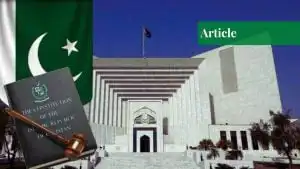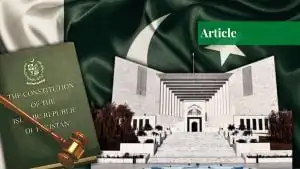The narcissism of small differences—a phenomenon I learned relatively recently but which sits extremely well with whatever is (and has been) happening in Pakistan—my home, my heartache.
From the moment my eyes met the light—or darkness if I may—all that I have seen is persecution: persecution of religious minorities; persecution of political opponents; and now persecution of the most respectable institution of the government: the Judiciary. While achieving judicial independence and impartiality is what Sisyphus’ endless struggle would look like, it doesn’t necessarily follow that judicial independence and impartiality are goods not worth pursuing.
Unfortunately, for those not educated in philosophy or law—and yes, this includes the legislators who supported the bill and the ones who pulled their strings—the 26th constitutional amendment is a baleful blow to not only judicial independence but also to the myriad of doctrines that underpin any legal system. The most important of which is the separation of powers.
Calling this constitutional amendment a win for parliamentary supremacy, as the Prime Minister did, is a little too ill-informed. But again, what is parliamentary supremacy? What empowers the parliament to be “supreme?” Is it the will of the people or the will of those who can strongarm the “selected” representatives of the people? So, is the parliament really supreme? Who are we kidding?
The 26th constitutional amendment to the Constitution of the “Islamic” Republic of Pakistan—need I remind readers that Pakistan wasn’t “Islamic” when it was founded until some people thought that the labeling would serve their ends—allows a “Special Parliamentary Committee” to choose the country’s Chief Justice from the top three senior-most Supreme Court judges.
For the past 77 torturous years of blunders and missteps or what we commonly refer to as Pakistan’s history, the Chief Justice of the Supreme Court has been appointed from the most senior judge sitting on the Supreme Court. This tradition ensured that the judiciary remained independent from external interference, not that there have not been attempts to influence the judiciary from within and outside the institution. Nevertheless, the fact that the office of the Chief Justice was not dependent upon the decision of a “Special Parliamentary Committee” was somewhat reassuring.
The 26th constitutional amendment means that the justices are not only to serve the public but also the parliamentarians. The judgments that once inked the law on paper would now also reflect political will—especially the one of those in power; and the ones who have remained in power since the country’s foundation. Let’s just stop there.
Circling back on the narcissism of small differences: it entails intense hostility over small or trivial differences between similar groups or individuals. This phenomenon can be seen in both the religious and political contexts in Pakistan.
From Shia vs. Sunni conflicts to the (constitutional) persecution of a particular religious sect to the extent that they can no longer claim their religious identity without the threat of being prosecuted by the state or, worse, being gunned down by self-proclaimed defenders of righteousness. In the political context, the clashes between PTI supporters and other political parties are the perfect examples of narcissism of small differences.
What are these masses truly fighting over? Whose belief is “better,” and whether the other side is “corrupt” or not? All because of their “leader” who, in reality, neither knows nor cares for them—someone who would never offer a helping hand when they are in need?
The narcissism of small differences seems to have extended to encompass rivalry between state institutions, not that it didn’t exist before. There was always a power tussle between the executives, the legislature, and the judiciary. To expect this struggle wouldn’t exist defeats the purpose of the separation of powers: a system of checks and balances. But never did this tussle, except for what happened in Zia’s and Musharraf’s era, seek to limit the judiciary’s role or independence in the way the 26th constitutional amendment aims to do—emphasis on the way.
It mustn’t be forgotten, however, that in Zia’s and Musharraf’s time, there was an illegitimate regime in place, both politically and legally, while Pakistan currently lives without such a constraint. Such “constitutional” amendments hint otherwise.
The executives and the legislature ganging up against the judiciary is troubling, to say the least.
If you want to submit your articles and/or research papers, please check the Submissions page.
The views and opinions expressed in this article/paper are the author’s own and do not necessarily reflect the editorial position of Paradigm Shift.






